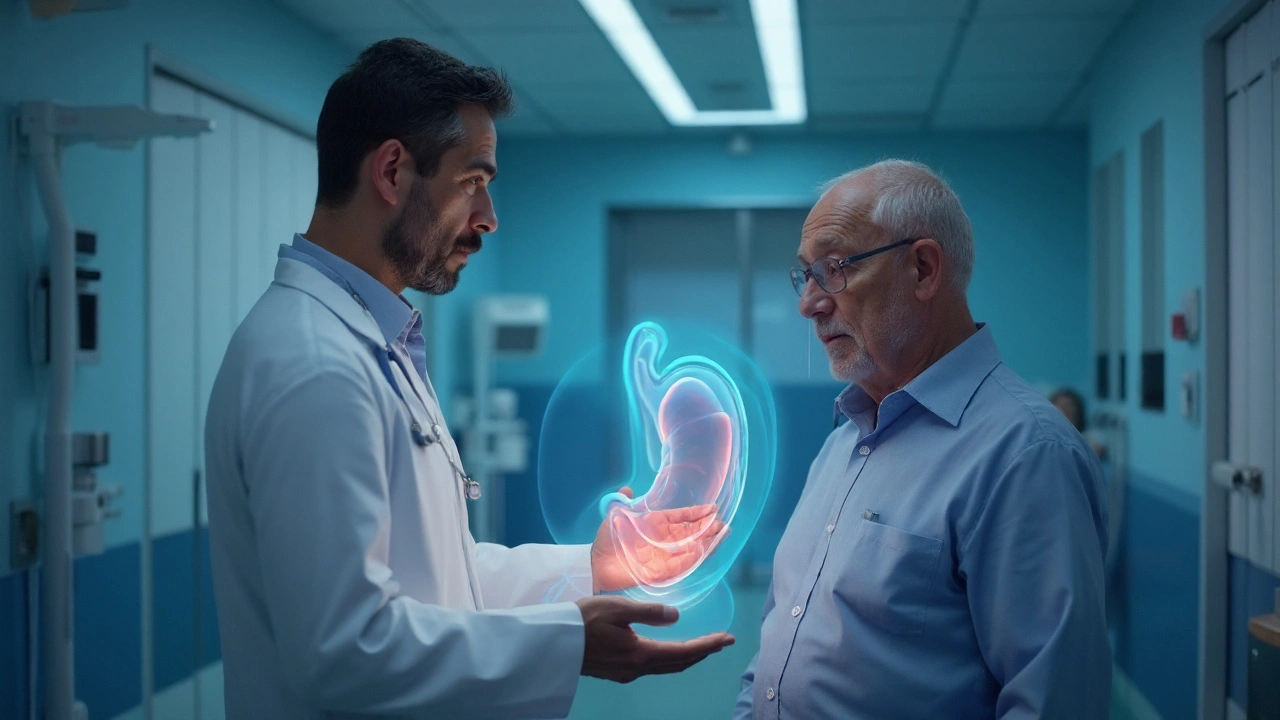Rifaximin Gastroparesis Symptom Checker
Quick Take
- Rifaximin is a gut‑focused antibiotic that targets bacterial overgrowth without systemic side‑effects.
- In gastroparesis, reducing small‑intestine bacterial load can improve gastric emptying and lessen nausea.
- Typical regimen: 550mg twice daily for 14days, repeated as needed under doctor supervision.
- Combine with prokinetics, dietary tweaks, and symptom‑focused anti‑emetics for best results.
- Monitor blood sugar and electrolyte balance, especially in diabetic patients.
Rifaximin is a non‑systemic, broad‑spectrum antibiotic that stays largely in the gastrointestinal tract, achieving concentrations up to 100‑times higher than oral antibiotics that are absorbed. Its low absorption (<0.5%) means fewer classic antibiotic side‑effects, making it attractive for chronic gut conditions.
Gastroparesis is a motility disorder where the stomach empties slower than normal, leading to nausea, early satiety, bloating and erratic blood‑sugar swings. The condition can be idiopathic, post‑viral, or secondary to diabetes, Parkinson’s disease, or certain medications.
Why does an antibiotic matter? Recent research points to a two‑way street between delayed gastric emptying and small intestinal bacterial overgrowth (SIBO). When the stomach empties slowly, food lingers, creating a fertile environment for bacteria to proliferate beyond the duodenum. The excess bacteria produce gas, ferment carbohydrates, and release inflammatory mediators that further impair motility-a vicious cycle.
How Rifaximin Breaks the Cycle
Rifaximin’s mechanism aligns perfectly with the SIBO‑gastroparesis loop:
- Targeted eradication: It suppresses gram‑positive, gram‑negative and anaerobic organisms commonly implicated in SIBO, such as Escherichia coli, Enterococcus and Clostridium spp.
- Minimal systemic exposure: Because it stays in the lumen, it doesn’t disturb the broader microbiome or increase risk of Clostridioides difficile infection.
- Anti‑inflammatory effect: By reducing bacterial endotoxin load, it dampens cytokine‑driven muscular dysfunction in the stomach wall.
- Improved gastric emptying: Clinical trials report a 20‑30% acceleration in gastric emptying time after a 14‑day course.
One 2023 double‑blind study of 84 gastroparesis patients showed that those receiving rifaximin experienced a mean reduction of 2.5 points on the Gastroparesis Cardinal Symptom Index (GCSI), compared with 0.8 points for placebo.
Putting Rifaximin into a Treatment Plan
Rifaximin is not a stand‑alone cure; it works best in a multimodal approach. Below is a step‑by‑step framework many gastroenterologists follow:
- Confirm diagnosis of gastroparesis with gastric scintigraphy or breath testing for SIBO.
- Start a short course of Rifaximin (550mg twice daily for 14days).
- Re‑evaluate symptoms after a week; if improvement is noted, consider maintenance: a repeat 14‑day course every 3‑4months.
- Prescribe a prokinetic (e.g., prucalopride or metoclopramide) to boost gastric contractions.
- Introduce dietary tweaks: low‑residue meals, smaller frequent portions, and limiting high‑FODMAP foods that feed bacteria.
- Use an anti‑emetic (e.g., ondansetron) during flare‑ups, but keep it short‑term to avoid sedation.
Patients with diabetes should have their insulin or oral hypoglycemics adjusted, as faster gastric emptying can lower post‑prandial glucose spikes.
Comparing Rifaximin with Other Antibiotics
| Antibiotic | Systemic Absorption | Typical Dose | Common Side‑effects | Evidence for Gastroparesis |
|---|---|---|---|---|
| Rifaximin | <0.5% | 550mg BID ×14days | Flatulence, mild nausea | Improved GCSI scores in multiple RCTs |
| Metronidazole | ≈15% | 250‑500mg TID ×7‑14days | Metallic taste, peripheral neuropathy (rare) | Modest symptom relief; higher relapse |
| Ciprofloxacin | ≈70% | 500mg BID ×7‑14days | Tendonitis, QT prolongation | Limited data; not first‑line |
Rifaximin’s low systemic absorption and strong evidence base make it the preferred choice for most clinicians dealing with gastroparesis‑linked SIBO.

Related Concepts and How They Interact
Understanding the broader ecosystem helps clinicians and patients make smarter decisions. Below are key topics that frequently intersect with the rifaximin‑gastroparesis equation:
- Prokinetics - drugs that stimulate gastric muscles (e.g., erythromycin, cisapride) often used alongside antibiotics.
- Gastric emptying studies - scintigraphy, wireless motility capsules, and breath tests provide objective measures to track treatment impact.
- Antiemetics - short‑term relief for nausea, chosen based on patient co‑morbidities.
- Dietary management - low‑fiber, low‑FODMAP, and liquid‑based meals reduce bacterial substrate and gastric load.
- Small bowel motility testing - manometry or electrogastrography identifies dysmotility patterns that may respond differently to antibiotics.
Clinicians often start with a gut‑focused antibiotic, then layer these adjuncts based on symptom severity and patient tolerance.
Practical Tips for Patients
Even the best drug can fall flat without proper adherence. Here are real‑world pointers:
- Take with water, not food: Food can slightly lower rifaximin’s luminal concentration, though the effect is modest.
- Stay hydrated: Diarrhea is uncommon but can occur; adequate fluids keep electrolytes balanced.
- Track symptoms: Use a simple diary - note meals, nausea scores (0‑10), and any abdominal bloating.
- Schedule follow‑up: A repeat gastric emptying test 4‑6weeks after therapy confirms whether the course helped.
- Watch for drug interactions: Rifaximin can induce CYP3A4 enzymes, potentially lowering concentrations of certain statins or oral contraceptives.
John, a 58‑year‑old with diabetic gastroparesis, reduced his GCSI from 5.2 to 2.3 after two 14‑day rifaximin courses, combined with low‑FODMAP meals and low‑dose prucalopride. His blood‑sugar swings also steadied, illustrating the domino effect of improved gastric emptying.
Safety, Contra‑indications, and Monitoring
Rifaximin is generally safe, but a few caution points apply:
- Pregnancy & lactation: Limited data; weigh benefits against unknown fetal risk.
- Severe hepatic impairment: Drug not recommended; altered metabolism may increase systemic exposure.
- Allergy to rifamycins: Contra‑indicated - look for rash or anaphylaxis history.
Baseline labs (CBC, liver enzymes, renal function) are advisable before starting a course, then repeat if therapy extends beyond 30days.
Future Directions
Research is moving toward personalized gut‑microbiome profiling. Early‑phase trials are testing targeted bacteriophage therapy alongside rifaximin to eradicate resistant SIBO strains.
Another avenue explores combining rifaximin with 5‑HT4 agonists (e.g., prucalopride) in a single‑pill formulation, aiming to hit both bacterial load and motility simultaneously.
Frequently Asked Questions
Can rifaximin cure gastroparesis?
No. Rifaximin addresses the bacterial overgrowth that often worsens gastroparesis. It can markedly improve symptoms and gastric emptying, but patients usually need ongoing prokinetic therapy, diet changes, and monitoring.
How long does a typical rifaximin course last?
The standard regimen is 550mg taken twice daily for 14days. Some clinicians repeat the course every 3‑4months if symptoms recur, always under specialist supervision.
Are there any food restrictions while taking rifaximin?
No strict restrictions, but it’s wise to avoid high‑FODMAP foods that feed bacteria. Taking the pills with a full glass of water on an empty stomach maximises luminal concentration.
What side‑effects should I watch for?
Most people experience mild flatulence or a transient metallic taste. Rarely, individuals develop elevated liver enzymes; that’s why baseline labs are recommended.
Can I combine rifaximin with other antibiotics?
Combination therapy isn’t standard because rifaximin already covers a broad spectrum in the gut. If a secondary infection is identified, a specialist may add a systemic antibiotic, but this should be closely monitored.

Kenneth Narvaez
September 24, 2025 AT 17:36Christian Mutti
September 25, 2025 AT 17:20Sharmita Datta
September 26, 2025 AT 21:38mona gabriel
September 26, 2025 AT 22:53Phillip Gerringer
September 28, 2025 AT 13:10jeff melvin
September 29, 2025 AT 05:42Matt Webster
October 1, 2025 AT 04:02Stephen Wark
October 1, 2025 AT 06:08Daniel McKnight
October 1, 2025 AT 16:24